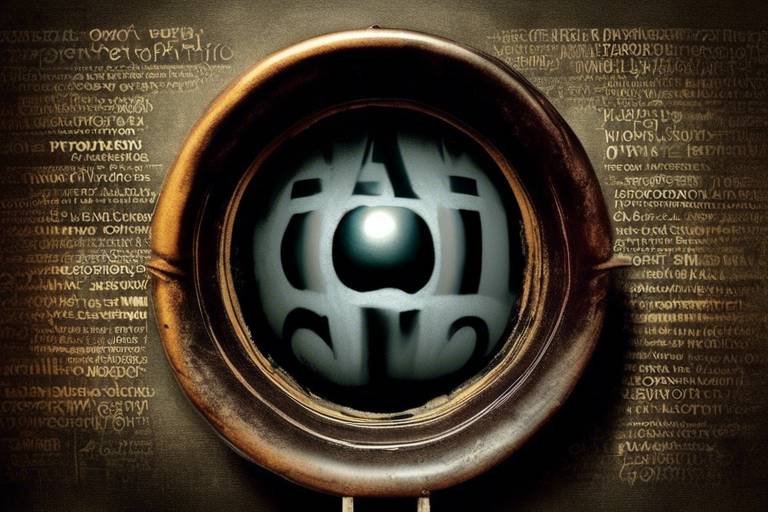Unveiling the Mysterious World of Metaphysics
Have you ever found yourself staring at the night sky, pondering the very essence of existence? Or perhaps you’ve wondered about the nature of reality itself? Welcome to the fascinating realm of metaphysics, a discipline that dives deep into questions that often seem too abstract or elusive for the everyday mind. Metaphysics isn’t just a dusty old subject confined to the pages of philosophy books; it’s a vibrant field that challenges our understanding of the universe and our place within it.
At its core, metaphysics seeks to answer profound questions such as: What is real? What does it mean to exist? How do we understand the concepts of time and space? These inquiries are like threads woven into the fabric of human thought, each leading us down a path of exploration and discovery. Engaging with metaphysical concepts can feel like embarking on a thrilling adventure, where every question opens the door to new mysteries and insights.
In this article, we’ll unravel the intricate layers of metaphysics, guiding you through its foundational principles, historical evolution, and key concepts that have shaped this enigmatic discipline. Whether you’re a seasoned philosopher or a curious newcomer, there’s something here for everyone. So, buckle up as we embark on this enlightening journey through the abstract yet profoundly significant world of metaphysics!
Understanding the basic principles of metaphysics is crucial for anyone interested in the deeper questions of life. This section delves into its definitions, key concepts, and the philosophical inquiries that form the foundation of this enigmatic discipline. Metaphysics can be broadly defined as the branch of philosophy that examines the fundamental nature of reality, including the relationship between mind and matter, substance and attribute, and potentiality and actuality.
Metaphysical inquiries often focus on several key concepts:
- Existence: What does it mean for something to exist?
- Reality: How do we differentiate between what is real and what is merely perceived?
- Causality: What is the nature of cause and effect in our universe?
- Time: Is time a linear progression, or does it have a more complex structure?
These fundamental ideas serve as the building blocks for deeper philosophical discussions and explorations. As we delve into the historical perspectives and key concepts of metaphysics, we’ll see how these inquiries have evolved and continue to shape our understanding of the world.
Metaphysics has evolved over centuries, shaped by the thoughts and ideas of countless philosophers. This section highlights significant historical figures and movements that have influenced metaphysical thought, from ancient philosophers to contemporary theorists. The journey through metaphysical history is like tracing a winding river, where each twist and turn reveals new insights and perspectives.
Exploring the contributions of ancient philosophers like Plato and Aristotle, we uncover how their ideas laid the groundwork for metaphysical inquiry and influenced future generations of thinkers. Their explorations into the nature of reality and existence continue to resonate today, serving as a foundation upon which modern metaphysics stands.
Plato's Theory of Forms posits that non-material abstract forms represent the most accurate reality. According to Plato, the physical world is merely a shadow of a higher, unchanging reality that can only be grasped through intellectual reasoning. This theory invites us to ponder the implications of abstract concepts in our understanding of existence.
Aristotle's exploration of substance and essence provides a critical framework for understanding existence. He proposed that everything in the universe is made up of substances that possess characteristics and attributes. This perspective challenges us to consider the essence of things and how they relate to the broader universe.
This section focuses on contemporary philosophers and their interpretations of metaphysics, showcasing how the discipline has adapted to modern scientific discoveries and philosophical debates. In an age where science and philosophy often intersect, modern metaphysical thought grapples with questions that arise from advancements in technology and our understanding of the cosmos.
Metaphysics encompasses various concepts, including existence, reality, causality, and time. This section breaks down these fundamental ideas and their significance within the field. Each concept serves as a lens through which we can examine the universe and our place in it.
Examining the distinction between existence and reality, this subheading explores how metaphysicians approach the nature of being and what it means to exist. Understanding existence is not just an academic exercise; it’s a deeply personal inquiry that influences how we live our lives.
Causality and time are pivotal in metaphysical discussions. This section evaluates their roles in understanding the universe and the relationships between events and processes. The interplay between cause and effect shapes our experiences and perceptions, leading us to question the very nature of time itself.
- What is metaphysics?
Metaphysics is a branch of philosophy that studies the fundamental nature of reality, including questions about existence, the universe, and the relationship between mind and matter. - Why is metaphysics important?
Metaphysics helps us understand the underlying principles of existence and reality, guiding us in our quest for knowledge and meaning. - How has metaphysics evolved over time?
Metaphysics has evolved from ancient philosophical inquiries to modern interpretations that incorporate scientific discoveries and new philosophical debates.

The Foundations of Metaphysics
Understanding the basic principles of metaphysics is crucial for anyone delving into this fascinating field. Metaphysics, at its core, is the branch of philosophy that explores the fundamental nature of reality. It tackles questions that often seem abstract or esoteric, yet they underpin much of our understanding of the world. What is existence? What does it mean for something to be real? These inquiries may seem simple, but they open up a vast landscape of philosophical exploration.
One of the key components of metaphysics is the distinction between ontology and epistemology. Ontology deals with the nature of being and existence, while epistemology concerns the nature and scope of knowledge. This duality is essential, as it allows metaphysicians to explore not only what exists but also how we come to know about it. For instance, when we ponder the existence of abstract concepts such as numbers or moral values, we engage in ontological discussions. Conversely, when we question how we can know these concepts exist, we are stepping into the realm of epistemology.
Moreover, metaphysics is intertwined with various key concepts that shape its inquiries. These include:
- Existence: What does it mean for something to exist? This question leads to discussions about the nature of being.
- Reality: How do we differentiate between what is real and what is merely perceived?
- Causality: What is the relationship between cause and effect in the fabric of reality?
- Time: Is time a linear progression, or is it something more complex?
Each of these concepts serves as a building block for deeper metaphysical inquiry. For example, the exploration of causality raises questions about determinism and free will. If every event has a cause, do we truly have control over our actions? This dilemma has intrigued philosophers for centuries and continues to be a hot topic in both philosophical and scientific circles.
In addition to these concepts, metaphysics also examines the properties of objects and the relationships between them. This exploration can lead to discussions about universals and particulars. Are there common properties shared by all objects, or is each object unique in its essence? This inquiry not only challenges our understanding of the world but also influences other fields of study, from physics to ethics.
As we venture further into the realm of metaphysics, it becomes evident that this discipline is not just an abstract exercise in thought. Its implications reach into our everyday lives, shaping our beliefs, values, and understanding of existence. By grappling with these foundational concepts, we can better appreciate the intricate web of reality that surrounds us.

Historical Perspectives
Metaphysics, often regarded as the philosophical inquiry into the nature of reality, has undergone a fascinating evolution over the centuries. Its rich history is marked by the contributions of numerous thinkers who have shaped our understanding of existence and the universe. From the ancient philosophers to contemporary theorists, each era has added layers of complexity and insight to this enigmatic discipline. The journey of metaphysical thought is not just a timeline of ideas; it's a reflection of humanity's quest to comprehend the very fabric of reality.
In ancient times, philosophers like Plato and Aristotle laid the groundwork for metaphysical inquiry, introducing concepts that continue to influence modern thought. Plato, through his allegorical tales, emphasized the distinction between the world of forms and the material world, suggesting that true knowledge lies beyond our sensory experiences. His Theory of Forms posits that non-material abstract forms represent the most accurate reality, a revolutionary idea that challenged the nature of perception and existence.
On the other hand, Aristotle took a more empirical approach. His exploration of substance and essence provided a critical framework for understanding existence. He argued that everything in the universe has a substance that defines its essence, a concept that has been pivotal in metaphysical discussions. Aristotle's insistence on observing the natural world laid the foundation for a more scientific approach to metaphysics, bridging the gap between philosophy and science.
As we transition into the Middle Ages, metaphysical thought was heavily influenced by religious perspectives, particularly within the context of Christianity, Islam, and Judaism. Thinkers such as Thomas Aquinas integrated Aristotelian philosophy with theological principles, arguing that reason and faith could coexist. This synthesis of ideas marked a significant turning point, as metaphysics began to address questions of existence not only from a philosophical standpoint but also from a spiritual one.
The Renaissance ushered in a new era of thought, characterized by a revival of classical ideas and a renewed focus on humanism. During this period, metaphysical discussions expanded to include the nature of the self and consciousness. Philosophers like René Descartes famously declared, "I think, therefore I am," emphasizing the significance of thought as a fundamental aspect of existence. His dualistic approach, separating mind and body, sparked debates that continue to resonate in contemporary metaphysical discussions.
The Enlightenment further propelled metaphysical inquiry, with philosophers like Immanuel Kant challenging the very foundations of metaphysics. Kant proposed that our understanding of reality is shaped by our perceptions and cognitive faculties, suggesting that we can never truly know the "thing-in-itself." This idea introduced a level of skepticism that reshaped the landscape of metaphysical thought, prompting questions about the limits of human understanding.
Fast forward to the 20th century, and we find metaphysics at a crossroads. The rise of analytical philosophy and logical positivism questioned the validity of metaphysical claims, arguing that many metaphysical assertions are meaningless unless they can be empirically verified. However, thinkers like Martin Heidegger and Alfred North Whitehead revitalized interest in metaphysical inquiries, emphasizing the importance of existence, time, and process in understanding reality.
Today, metaphysics continues to thrive, adapting to modern scientific discoveries and philosophical debates. The exploration of concepts such as quantum mechanics and consciousness has opened new avenues for metaphysical inquiry, challenging our traditional notions of reality. As we delve deeper into the mysteries of existence, the historical perspectives of metaphysics remind us of the enduring nature of these questions and the myriad ways humanity has sought to answer them.
- What is metaphysics? Metaphysics is a branch of philosophy that explores the fundamental nature of reality, existence, and the relationships between objects and their properties.
- Who are some key figures in the history of metaphysics? Key figures include Plato, Aristotle, Thomas Aquinas, René Descartes, Immanuel Kant, and Martin Heidegger, each contributing significantly to the field.
- How does metaphysics relate to modern science? Metaphysics often intersects with scientific inquiry, especially in areas like quantum mechanics and consciousness studies, prompting philosophical questions about the nature of reality.

Ancient Philosophers
When we delve into the realm of metaphysics, we can't help but encounter the profound contributions of ancient philosophers who laid the groundwork for this intricate discipline. Think about it: without their insights, our understanding of existence and reality might look vastly different today. Among these intellectual giants, Plato and Aristotle stand out as pivotal figures whose ideas continue to resonate through the ages.
Plato, a student of Socrates, introduced the Theory of Forms, which posits that the material world is merely a shadow of a higher, unchangeable reality. According to Plato, these abstract Forms or Ideas are the true essence of all things. Imagine trying to grasp the concept of beauty without ever having seen a beautiful object; for Plato, the Form of Beauty exists independently of any beautiful things we encounter in our world. This notion challenges us to think about the nature of reality itself: is what we perceive truly real, or is it just a fleeting image of something far more profound?
On the other hand, we have Aristotle, who took a more empirical approach. As a student of Plato, he appreciated his teacher's ideas but sought to ground them in observable reality. Aristotle's Substance Theory revolves around the idea that everything in the universe is made up of substances that possess both form and matter. For him, understanding the essence of a thing requires examining its substance—what it is fundamentally. Think of it like peeling an onion: to truly understand the onion, you must look beyond its outer layers and get to the core.
These ancient thinkers didn't just stop at abstract ideas; they laid the foundation for countless philosophical inquiries that followed. Their thoughts on existence, reality, and the nature of being have sparked discussions that continue to this day. The influence of Plato and Aristotle can be seen in various fields, from psychology to science, as their inquiries into the essence of things have shaped how we perceive our world.
In addition to their theories, the methods they employed to explore these concepts were groundbreaking. Both philosophers utilized dialectical reasoning, a form of dialogue aimed at uncovering truths through questioning and debate. This method not only enriched their own understanding but also paved the way for future philosophers to engage in rigorous intellectual exploration. It's as if they were lighting a torch in a dark cave, illuminating the path for others to follow.
In summary, the contributions of ancient philosophers like Plato and Aristotle are invaluable to the field of metaphysics. Their explorations into the nature of reality and existence have not only shaped philosophical thought but have also influenced the development of Western philosophy as a whole. As we continue to explore metaphysical concepts, we owe a debt of gratitude to these thinkers whose ideas still ignite our curiosity and inspire our quest for knowledge.
- What is metaphysics? Metaphysics is a branch of philosophy that explores the fundamental nature of reality, existence, and the relationships between objects and their properties.
- Who are the key figures in ancient metaphysics? The key figures include Plato and Aristotle, whose theories laid the groundwork for metaphysical inquiry.
- How did Plato's Theory of Forms influence metaphysics? Plato's Theory of Forms suggests that non-material abstract forms represent the most accurate reality, prompting discussions about the nature of existence.
- What is Aristotle's Substance Theory? Aristotle's Substance Theory focuses on understanding existence through the examination of substances that possess both form and matter.

Plato's Theory of Forms
Plato's Theory of Forms is a cornerstone of his philosophical thought, presenting a fascinating view of reality that continues to provoke discussion and debate today. At its core, this theory asserts that the material world we perceive through our senses is merely a shadow of a higher, more perfect realm of abstract entities known as Forms or Ideas. Imagine walking through a gallery filled with paintings; what you see are mere representations of the true essence of beauty, which exists only in the realm of Forms. In Plato's view, these Forms are the most accurate reality, transcending the imperfect objects we encounter in our everyday lives.
To understand this theory better, we can break it down into a few key points:
- Abstract Reality: According to Plato, every object or quality in the physical world corresponds to a perfect Form. For instance, the concept of 'beauty' exists as a perfect Form, while all beautiful things in the world are merely reflections of this ideal.
- Knowledge and Perception: Plato believed that true knowledge comes from understanding these Forms rather than relying on sensory experience. He argued that our senses can deceive us, leading us to misunderstand the true nature of reality.
- Hierarchy of Forms: Plato categorized Forms into a hierarchy, with the Form of the Good at the top. This ultimate Form is the source of all other Forms and is essential for understanding the nature of existence.
This theory not only influenced metaphysics but also laid the groundwork for epistemology, the study of knowledge. By emphasizing the importance of the Forms, Plato challenged us to think critically about what we consider 'real.' He posed the question: if our perceptions can be misleading, how do we determine what is truly real? This inquiry is as relevant today as it was in ancient Greece, highlighting the enduring impact of Plato's ideas.
In practical terms, Plato's Theory of Forms encourages us to seek deeper understanding beyond superficial appearances. For example, when we encounter different instances of beauty—like a stunning sunset or a breathtaking piece of art—we are reminded that these are just reflections of a greater truth. The real challenge lies in grasping the essence of beauty itself, which eludes our senses.
In summary, Plato's Theory of Forms invites us to explore the profound relationship between the tangible world and the abstract realm of ideas. It serves as a reminder that while we navigate our daily lives, there is a deeper layer of reality that shapes our understanding and experiences. This philosophical inquiry not only enriches our comprehension of existence but also inspires us to seek knowledge beyond the ordinary.
- What are Plato's Forms? Plato's Forms are abstract, perfect entities that represent the true essence of various qualities and objects in the material world.
- Why are Plato's Forms important? They provide a framework for understanding the distinction between the ideal and the real, influencing various philosophical disciplines.
- How does Plato's Theory of Forms relate to modern philosophy? The theory challenges us to consider the nature of reality and knowledge, themes that remain central in contemporary philosophical debates.

Aristotle's Substance Theory
Aristotle's Substance Theory is a cornerstone of his metaphysical thought, providing a framework that helps us understand the essence of existence. At its core, this theory posits that substances are the fundamental entities that make up reality. Unlike Plato, who emphasized abstract Forms as the true essence of things, Aristotle grounded his philosophy in the tangible world, suggesting that substances are not merely abstract ideas but concrete entities that possess both form and matter.
To grasp Aristotle's perspective, we need to break down the two key components of his theory: form and matter. Form refers to the essential characteristics that define a substance, while matter is the physical substance that composes it. For instance, consider a wooden table. The wood is the matter, while the design and function of the table represent its form. Together, they create a unified whole, which Aristotle refers to as a substance. This duality is crucial because it allows us to understand how things exist in the world: they are not just a collection of properties, but rather coherent entities with a specific identity.
Aristotle further distinguishes between different types of substances. He categorizes them into primary substances, which are individual entities (like a particular dog or tree), and secondary substances, which are the species or genera to which these entities belong (like 'dog' or 'tree'). This classification helps to clarify the relationships between different entities and how they interact within the broader context of reality. Understanding these relationships is essential for navigating the complexities of existence.
Moreover, Aristotle's Substance Theory also addresses the concept of change. He argues that while substances can undergo change, their essence remains intact. For example, a tree may lose its leaves in winter, but it is still fundamentally a tree. This idea of persistence through change is vital for understanding how we perceive reality over time. In essence, Aristotle's approach provides a robust framework for examining not just what things are, but how they relate to each other and evolve.
In conclusion, Aristotle's Substance Theory invites us to ponder profound questions about existence and identity. It challenges us to consider what it means for something to be real and how we can discern the essence of things in a world that is constantly changing. By grounding metaphysical inquiry in the tangible, Aristotle offers a compelling perspective that continues to influence philosophical thought today.
- What is the main idea of Aristotle's Substance Theory?
Aristotle's Substance Theory posits that substances are the fundamental entities of reality, composed of both form and matter. - How does Aristotle's view differ from Plato's?
While Plato emphasized abstract Forms as the essence of reality, Aristotle focused on concrete entities and their characteristics in the physical world. - What are primary and secondary substances?
Primary substances are individual entities (like a specific dog), while secondary substances refer to the categories or species they belong to (like 'dog'). - How does Aristotle's theory address change?
Aristotle argues that substances can undergo change while maintaining their essential identity, allowing them to persist through transformations.

Modern Metaphysical Thought
As we step into the realm of , we find ourselves navigating through a landscape rich with evolving ideas and interpretations. The 20th and 21st centuries have witnessed a remarkable transformation in metaphysics, driven by advancements in science, shifts in philosophical perspectives, and the quest for understanding the very essence of reality. This era has seen philosophers grappling with questions that were once considered the domain of metaphysics, now intertwined with scientific inquiry, particularly in fields such as quantum physics and cosmology.
One of the most significant movements in modern metaphysical thought is process philosophy, championed by thinkers like Alfred North Whitehead. Whitehead proposed that reality is not a collection of static entities but rather a series of interconnected events and processes. This idea challenges traditional notions of substance and encourages us to view existence as a dynamic interplay of forces. Imagine a river, constantly flowing and changing, rather than a stagnant pond—this is the essence of process philosophy.
Moreover, the rise of analytic philosophy has also left its mark on metaphysical discussions. Philosophers like W.V.O. Quine have questioned the very foundations of metaphysical claims, arguing for a more empirical approach. Quine's famous assertion that “to be is to be the value of a bound variable” invites us to reconsider the criteria we use to define existence itself. This perspective urges us to ground our metaphysical inquiries in observable phenomena, creating a bridge between abstract thought and scientific evidence.
In addition to these movements, the influence of postmodern philosophy cannot be overlooked. Thinkers such as Jacques Derrida and Michel Foucault have challenged the idea of absolute truths in metaphysical discourse. They argue that our understanding of reality is shaped by language, culture, and power dynamics, suggesting that what we consider "real" is often a construct rather than an objective truth. This perspective adds a layer of complexity to metaphysical discussions, inviting us to question the very frameworks we use to interpret existence.
As we delve deeper into modern metaphysical thought, we encounter the intriguing concept of ontological pluralism. This idea posits that multiple ways of being exist, each valid within its own context. For instance, the existence of physical objects, abstract concepts, and even social constructs can all be understood as different modes of being. This pluralistic approach encourages a more inclusive understanding of reality, allowing for a richer tapestry of existence that acknowledges the diversity of experiences and interpretations.
In summary, modern metaphysical thought is a vibrant and evolving field that continues to adapt to new discoveries and challenges. As we explore the intricate connections between philosophy and science, we uncover a dynamic interplay that shapes our understanding of existence. Whether through process philosophy, analytic scrutiny, postmodern critiques, or ontological pluralism, the journey through modern metaphysics is one filled with excitement and profound questions. It invites us to reflect on our place in the universe and the very nature of reality itself.
- What is metaphysics? Metaphysics is a branch of philosophy that explores the fundamental nature of reality, including concepts such as existence, objects, and their properties.
- How has metaphysics changed over time? Metaphysics has evolved from ancient philosophical inquiries to modern discussions that incorporate scientific perspectives and critiques of traditional notions of reality.
- What are some key concepts in modern metaphysics? Key concepts include process philosophy, ontological pluralism, and the influence of analytic and postmodern thought.
- Why is metaphysics relevant today? Metaphysics remains relevant as it addresses profound questions about existence, reality, and our understanding of the universe, often intersecting with scientific discoveries.

Key Concepts in Metaphysics
Metaphysics, often regarded as the backbone of philosophy, dives deep into the **mysterious** nature of reality. It's like peeling an onion—each layer reveals more questions than answers. At its core, metaphysics is concerned with some of the most fundamental concepts that shape our understanding of the universe. These include existence, reality, causality, and time. Each of these concepts plays a crucial role in how we interpret our experiences and the world around us.
Let's start with existence. What does it mean to exist? This question has puzzled philosophers for centuries. Existence is not merely about being present in the physical world; it encompasses a broader inquiry into what it means for something to 'be.' For instance, consider the difference between a physical object, like a chair, and an abstract concept, like justice. Both can be said to exist, yet they occupy very different realms of reality. This distinction is vital in metaphysical discussions, as it influences how we categorize and understand various entities.
Next, we have reality. This concept raises the question of what constitutes the 'real world.' Is reality simply what we can perceive with our senses, or is there more to it? Some metaphysicians argue that reality extends beyond our sensory experiences, suggesting that there are underlying truths that we may not fully grasp. This idea is reminiscent of Plato's Theory of Forms, where he posits that the material world is just a shadow of a higher, more perfect reality. In this light, metaphysics encourages us to explore not just what we see, but what lies beneath the surface.
Moving on to causality, this concept deals with the relationship between cause and effect. Why do things happen the way they do? Causality is integral to our understanding of events and processes in the universe. It’s like a chain reaction—one event leads to another, creating a web of interconnected occurrences. In metaphysical terms, causality raises questions about whether every event has a cause or if some things can happen randomly without a preceding force. This inquiry can lead to further debates about determinism versus free will, making it a cornerstone of metaphysical thought.
Lastly, we must consider time. Time is often perceived as a linear progression from past to present to future. However, metaphysicians challenge this notion by asking whether time is an absolute entity or merely a human construct. Is the future already determined, or do we have the power to shape it? This exploration of time not only influences metaphysical theories but also intersects with scientific discussions in physics, particularly in the realms of relativity and quantum mechanics.
| Concept | Definition | Significance |
|---|---|---|
| Existence | The state of being present or having reality. | Fundamental to understanding what it means to 'be.' |
| Reality | The state of things as they actually exist. | Explores the nature of the world beyond perception. |
| Causality | The relationship between cause and effect. | Central to understanding events and processes. |
| Time | The progression of events from past to present to future. | Influences our understanding of change and existence. |
In conclusion, the key concepts of metaphysics not only challenge our perceptions but also enrich our understanding of existence itself. They invite us to question the very fabric of reality and encourage a deeper exploration of the universe. As we continue to ponder these ideas, we find ourselves not just as passive observers but as active participants in the grand narrative of existence.
- What is metaphysics? Metaphysics is a branch of philosophy that examines the fundamental nature of reality, including concepts like existence, reality, causality, and time.
- Why is metaphysics important? Metaphysics helps us understand the underlying principles of existence and reality, shaping our worldview and influencing other fields like science and ethics.
- How does metaphysics relate to science? While metaphysics deals with abstract concepts, it often intersects with scientific inquiry, especially in areas like quantum mechanics and the nature of time.

Existence and Reality
When we dive into the depths of existence and reality, we find ourselves standing at the crossroads of profound philosophical inquiry. What does it truly mean to exist? And how does our understanding of reality shape our perceptions and experiences? These questions have captivated thinkers for centuries, leading to a rich tapestry of ideas that challenge our everyday assumptions.
To begin unraveling this complex web, we must first consider the distinction between existence and reality. Existence refers to the state of being; it answers the question of whether something is present or can be identified. Reality, on the other hand, encompasses the totality of what exists and the nature of those existences. It’s like the difference between a shadow and the object casting it. The shadow (existence) is a mere representation, while the object (reality) holds substance and essence.
Philosophers like René Descartes famously proclaimed, “I think, therefore I am,” which highlights the act of thinking as a fundamental proof of existence. But does this mean that everything we perceive is real? Not necessarily. Our senses can deceive us, leading us to question the authenticity of our experiences. For instance, consider the phenomenon of optical illusions. They challenge our perception of reality, illustrating that what we see may not always align with what truly exists.
Furthermore, metaphysicians have long debated the nature of reality itself. Is it objective, existing independently of our perceptions, or is it subjective, shaped by our consciousness? This leads us to the concept of idealism versus realism. Idealists argue that reality is mentally constructed, while realists maintain that it exists outside of our thoughts. This philosophical tug-of-war raises intriguing points about how we interpret the world around us.
To further illustrate these concepts, consider the following table that summarizes key philosophical perspectives on existence and reality:
| Philosophical Perspective | Key Idea |
|---|---|
| Realism | Reality exists independently of our perceptions. |
| Idealism | Reality is mentally constructed and dependent on consciousness. |
| Phenomenalism | Objects only exist as sensory phenomena. |
| Existentialism | Focuses on individual existence and the meaning of life. |
As we navigate this intricate landscape, we must also consider the implications of our understanding of existence and reality on our daily lives. For example, how do our beliefs about reality influence our decisions, relationships, and overall well-being? When we recognize that our perceptions can be flawed, we may become more open to different perspectives and ideas, fostering empathy and understanding in our interactions with others.
In conclusion, the exploration of existence and reality is not just an abstract exercise; it is a vital part of what it means to be human. By questioning our assumptions and delving into these philosophical inquiries, we can enrich our understanding of ourselves and the world around us. So, the next time you ponder your place in the universe, remember that you are not just existing; you are part of a grand reality that invites curiosity and wonder.
- What is the difference between existence and reality? Existence refers to the state of being, while reality encompasses the totality of what exists and how those existences interact.
- Can our perceptions of reality be trusted? Not always. Our senses can be deceived, leading to questions about the authenticity of our experiences.
- What are the main philosophical perspectives on reality? Key perspectives include realism, idealism, phenomenalism, and existentialism, each offering unique insights into the nature of existence.

Causality and Time
Causality and time are fundamental concepts that permeate our understanding of the universe, acting as the threads that weave together the fabric of existence. Imagine causality as a river, with each event flowing into the next, creating a continuous stream of influence and consequence. This notion of cause and effect is not just a philosophical abstraction; it is a lens through which we interpret everything from the mundane to the profound. But what exactly do we mean when we speak of causality? Is it merely a sequence of events, or does it imply something deeper about the nature of reality itself?
In metaphysical discussions, causality is often viewed as the principle that everything that happens is the result of some preceding event or condition. This leads us to ponder the nature of time itself. Is time linear, flowing in one direction from past to future, or is it cyclical, repeating in an endless loop? Philosophers and scientists alike have wrestled with these questions, attempting to understand how time interacts with causality. For instance, when we observe a ball rolling down a hill, we can trace its movement back to the force that set it in motion. But what about events that seem to defy this straightforward relationship, such as quantum phenomena where cause and effect appear to blur? This ambiguity opens the door to fascinating debates within both metaphysics and science.
Moreover, the relationship between causality and time brings us to the concept of temporal order. In our daily lives, we experience events in a specific sequence: we eat breakfast before heading to work, and we sleep after a long day. This temporal order reinforces our understanding of causality, as we associate actions with their outcomes. However, in the realm of metaphysics, this relationship is more complex. Consider the idea of time travel, which challenges our conventional understanding of causality. If one were to travel back in time and alter a significant event, would that not create a paradox? This leads to intriguing discussions about the nature of free will and determinism.
To better grasp these concepts, let’s explore a simplified table that illustrates the relationship between causality, time, and various philosophical perspectives:
| Philosopher | Causality Perspective | Time Perspective |
|---|---|---|
| Aristotle | Four Causes: Material, Formal, Efficient, Final | Linear; time as a measure of change |
| David Hume | Empirical; causation is a habit of thought | Subjective; perception of time varies |
| Immanuel Kant | Transcendental; causality is a category of understanding | Constructed; time is a framework for understanding experience |
| Modern Physics | Quantum mechanics challenges classical causality | Non-linear; theories of time in relativity |
As we navigate through these philosophical waters, it becomes clear that causality and time are not merely abstract concepts; they are essential to our understanding of reality. They shape our perceptions, influence our decisions, and ultimately define our existence. The interplay between these two elements invites us to question the very nature of our universe. Are we simply passengers on a linear timeline, or do we possess the ability to influence the course of events? The answers may not be straightforward, but the exploration of these questions enriches our understanding of both philosophy and science.
- What is causality? Causality refers to the relationship between causes and effects, where one event (the cause) leads to the occurrence of another event (the effect).
- Is time linear or cyclical? While many perceive time as linear, some philosophical and scientific theories suggest it could be cyclical, repeating in patterns.
- How does modern physics view causality? In modern physics, particularly in quantum mechanics, causality can appear non-linear and complex, challenging traditional notions of cause and effect.
Frequently Asked Questions
- What is metaphysics?
Metaphysics is a branch of philosophy that explores the fundamental nature of reality, including concepts such as existence, objects and their properties, space and time, causality, and possibility. It delves into questions that go beyond the physical sciences, seeking to understand what it means for something to exist and the nature of reality itself.
- How did ancient philosophers contribute to metaphysical thought?
Ancient philosophers like Plato and Aristotle laid the groundwork for metaphysical inquiry. Plato introduced the Theory of Forms, suggesting that non-material abstract forms represent the most accurate reality. Aristotle, on the other hand, focused on substance and essence, providing a framework that helped shape later metaphysical discussions.
- What are the key concepts in metaphysics?
Key concepts in metaphysics include existence, reality, causality, and time. These ideas are crucial for understanding how we perceive the universe and the relationships between different entities and events. Each concept helps to frame philosophical inquiries and debates about the nature of being and the structure of reality.
- How does modern metaphysical thought differ from ancient views?
Modern metaphysical thought has evolved to incorporate insights from contemporary science and philosophy. While ancient views focused on abstract forms and substances, modern discussions often engage with scientific discoveries and aim to reconcile metaphysical theories with empirical findings, leading to a more nuanced understanding of existence and reality.
- Why is metaphysics relevant today?
Metaphysics remains relevant today because it addresses fundamental questions that science alone cannot answer. It encourages critical thinking about existence, reality, and our understanding of the universe, prompting philosophical discussions that can influence other fields, including ethics, epistemology, and even quantum physics.
- Can metaphysics and science coexist?
Absolutely! While science focuses on empirical evidence and observable phenomena, metaphysics explores the underlying principles and concepts that govern those phenomena. They can coexist and complement each other, with metaphysical inquiries providing a broader context for scientific discoveries.



















